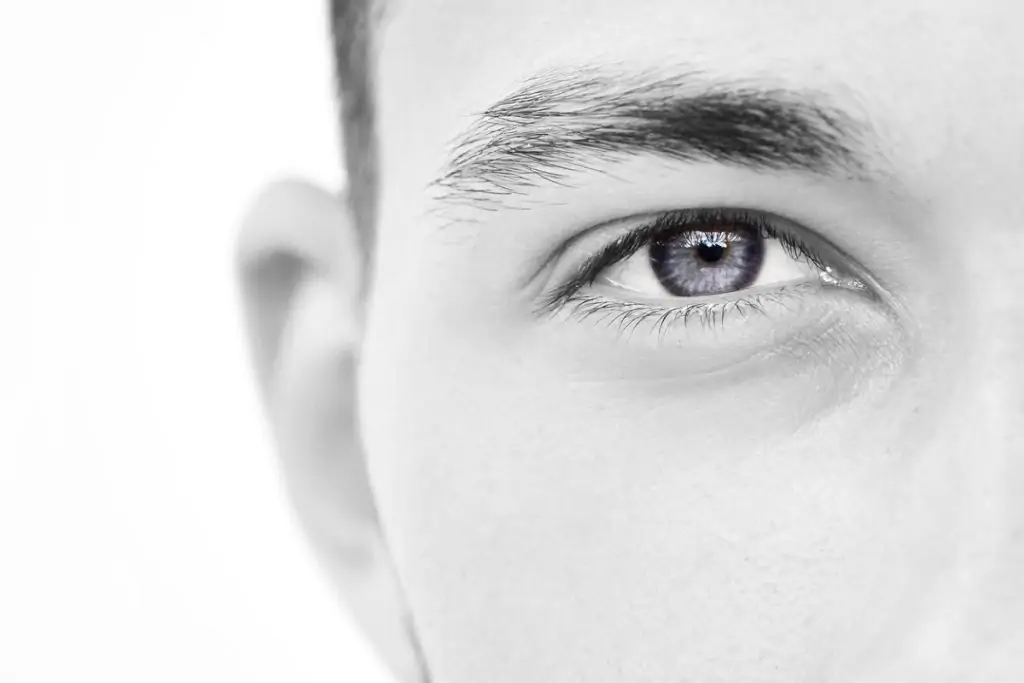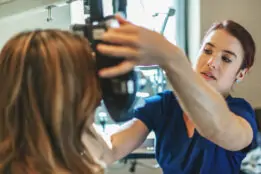The LASIK Complications Facts: Should You Worry?

If you are thinking about having your vision improved with a laser vision correction procedure such as LASIK, you are naturally going to want to know about the potential for LASIK complications. It is natural to worry, and healthy to investigate, the risks, along with the benefits of any procedure – particularly one you are choosing for your vision. The good news for those looking into LASIK is there is a tremendous amount of scientific research that proves LASIK is a safe and effective vision correction option for those who are good candidates for the procedure. Let’s look at the facts.
The data from the thousands of clinical studies around LASIK showcase its outstanding record for safety, a fact the U.S. Food and Drug Administration (FDA) has repeatedly affirmed since the procedure was first approved nearly 20 years ago. The body of evidence – which today totals more than 7,000 studies – and the clinical experience with LASIK estimates the risk of significant, sight-threatening LASIK complications is an extremely low 1 percent. Laser vision correction has been available for more than 20 years and in that time, more than 19 million LASIK procedures have been performed in the U.S. Patient satisfaction is very high, averaging more than 96 percent. This high degree of patient satisfaction is due, in part, to the extremely low risk of LASIK complications. In fact, recent clinical studies suggest the risk of vision loss due to infection is much higher with contact lenses than LASIK over a lifetime of use.
Understanding the Nature of LASIK Complications
However, all surgeries come with risks. To make an informed decision about LASIK or any laser vision correction procedure, you need to educate yourself about not only the benefits of LASIK but also the risk for potential symptoms and side effects. The most common side effects of LASIK are those experienced as part of the normal healing process and recovery period. These include night vision visual symptoms, such as glare, halos, ghosting, and starbursts, as well as dry eye. Generally, these symptoms go away over time, but sometimes additional treatment may be needed.
Importantly, side effects and symptoms that occur during the recovery and healing process are not LASIK complications. The term “complication” is often used inaccurately to describe symptoms and side effects. In fact, surgical complications from laser vision correction are very rare. The clinical experience with LASIK indicates complications, such as flap dislocations and infections can occur but are very rare.
Getting the Facts About LASIK Complications
Misinformation about medical subjects on the internet is unfortunately very prevalent. This is can be particularly harmful to those who are researching health issues. Keep in mind that while you may start your research online, nothing takes the place of a quality consultation with a surgeon specializing in laser vision correction, also known as refractive surgery. However, taking the time to independently educate yourself about LASIK and other laser vision correction procedures helps you come up with a list of questions, determine if it’s right for you, and is helpful in making a good decision.
But beware as you make your way across the internet. Laser vision correction is a field of science and medicine and, unfortunately, often credible clinical research gets mishandled, misreported, and misinterpreted as it gets posted, tagged, and shared. Most of the time, this is the result of simply not being an expert, skilled in interpreting research, carelessness, or inattentiveness. However, it is also easy to find sources that make a concerted effort to deliberately deceive readers with old or error-ridden “facts” about LASIK complications. Here are a few suggestions for ways to identify credible sources on the internet:
- Have the patience to look through search results to find high-quality resources and information. Companies pay to be at the top of search results.
- Try to avoid .com sites. Instead look for URLs ending in .org, .edu and even some .gov sites.
- Rely on information from credible organizations such as the American Academy of Ophthalmology (AAO), the American Society of Cataract and Refractive Surgery (ASCRS), and the Refractive Surgery Council (RSC).
- Check into the sites you are relying on. Go to the “About Us” section of the website and make sure there are experts and doctors involved in reviewing the information on the site.
- Regardless of the sponsor of the website, be skeptical. Is the information up to date, biased or agenda-driven? Are there any research citations to support it?
- Does the site ask for your personal information (sometimes more than once)?
- Are there a lot of pop-up ads? Do the headlines read like click-bait?
The point is to take what is served up to you on the internet at face value until you have the opportunity to validate it as accurate. You want to learn the facts about a health matter, so being confident in the source of the information is important. Medical information is sometimes complex, but good resources make the effort to present the facts in a way that is understandable, informative, and educational. Sites that offer credible, research-backed content are very useful in making an informed decision.
News Reports May Not Include All The Facts
Many people rely on broadcast news and newspapers to help them understand medical research and information. However, even the news media are guilty of oversimplifying or mistakenly placing clinical data in the wrong context. One recent example of this follows the news from a study performed by the U.S. Food and Drug Administration (FDA) evaluating the quality of life of LASIK patients. The research acknowledged LASIK is both very safe and effective, and the researchers wanted to learn more about the LASIK experience. The researchers developed and tested a survey questionnaire for LASIK patients to provide personal answers about their vision and the impact of any symptoms on their quality of life up to 6 months after surgery. The study was designed to scientifically validate the questionnaire, not to evaluate clinical outcomes.
When the FDA published the research and released the findings to the news media, a surprising number of nationally-recognized news outlets published and aired stories that misreported the study by:
- Failing to report the goal of the study; to validate the FDA’s LASIK patient questionnaire so that it might be used in the future by researchers and clinicians to include patient-reported data in their studies.
- Choosing to report clinical outcomes data, although the research was not designed as a clinical study and the patient follow-up period was very limited.
- Misinterpreting clinical data giving the false impression of a high rate of LASIK complications.
Stories such as this were not meant to confuse but are unfortunate nonetheless for those who are considering a laser vision correction procedure because it makes it difficult for them to find accurate information to help make a confident decision about their vision.
Here, we offer the realities of complications after LASIK from a clinical perspective. The data presented here reflects the most up-to-date understanding of the very rare complications that occur.
Frequently Asked Questions About LASIK Complications
What are possible flap complications? How often do LASIK flaps move or come off?
The answer to this question is almost never. LASIK flaps have hinges that hold them in position so that in the rare occasion a patient is hit in the eye the flap may move but will not “come off”. The good news is that if a LASIK flap does move the flap can be repositioned.
Older studies with older technology indicate that flap complications occur in from 0.3 to 5.7 percent of LASIK procedures, according to the April 2006 issue of the American Journal of Ophthalmology. In a study of 3,009 consecutive LASIK surgeries performed August 2002 through July 2009 using a femtosecond laser for flap creation, flap complications occurred in fewer than one-half of 1 percent (0.37 percent) of these procedures, and all complications were successfully managed within the same surgical session with little or no effect on vision.
How often do infections occur as a complication after LASIK?
Patients having LASIK are given antibiotic drops to reduce the risk of infection. According to the latest comprehensive review of the literature, the rate of infection related to LASIK is about 1/2000 cases and most of these infections have no effect on vision
How often does LASIK cause blindness?
LASIK has never been the primary, exclusive cause of blindness with millions of patients having undergone the procedure.
Getting Accurate Information about LASIK
If you are weighing your vision correction options and wondering if LASIK is right for you, take some time to do some research on your own.
If you are weighing your vision correction options and wondering if LASIK is right for you, take some time to do some research on your own. Of course, the internet is a terrific resource but, as mentioned earlier, make sure the information sources you use to make your decision are credible, accurate, and factual.
Here are a few tips for avoiding potential pitfalls of misinformation:
- Start with people you know in real life. Get referrals, recommendations, and real-life experiences from friends and family who have had a laser vision correction procedure. This simple step will likely help you in your first step to research online.
- Don’t rely solely on the sponsored search results, but you don’t have to ignore them either.
- Personal experiences are just that – personal. One experience is not a trend.
- Patient support and advocacy groups may be too specific and personal to be useful in your decision-making.
- Just because a celebrity had a laser vision correction procedure doesn’t mean getting LASIK is right for you.
- If you get squeamish – skip any type of surgery videos – you won’t find them at all helpful or comforting. (Animations are better to look at if you want to know how LASIK and other laser vision correction procedures are performed).
- Social media is great for referrals, but probably not the place for facts about a procedure.
At the end of the day, getting LASIK is a choice. LASIK is an elective medical procedure, it is a choice to be made. Getting good quality information about laser vision correction, its benefits, and the risks of LASIK complications is best for making a confident decision. Anything you find researching should be confirmed or clarified by your surgeon. Together, you can make the best decision for you to achieve your best visual outcome.




